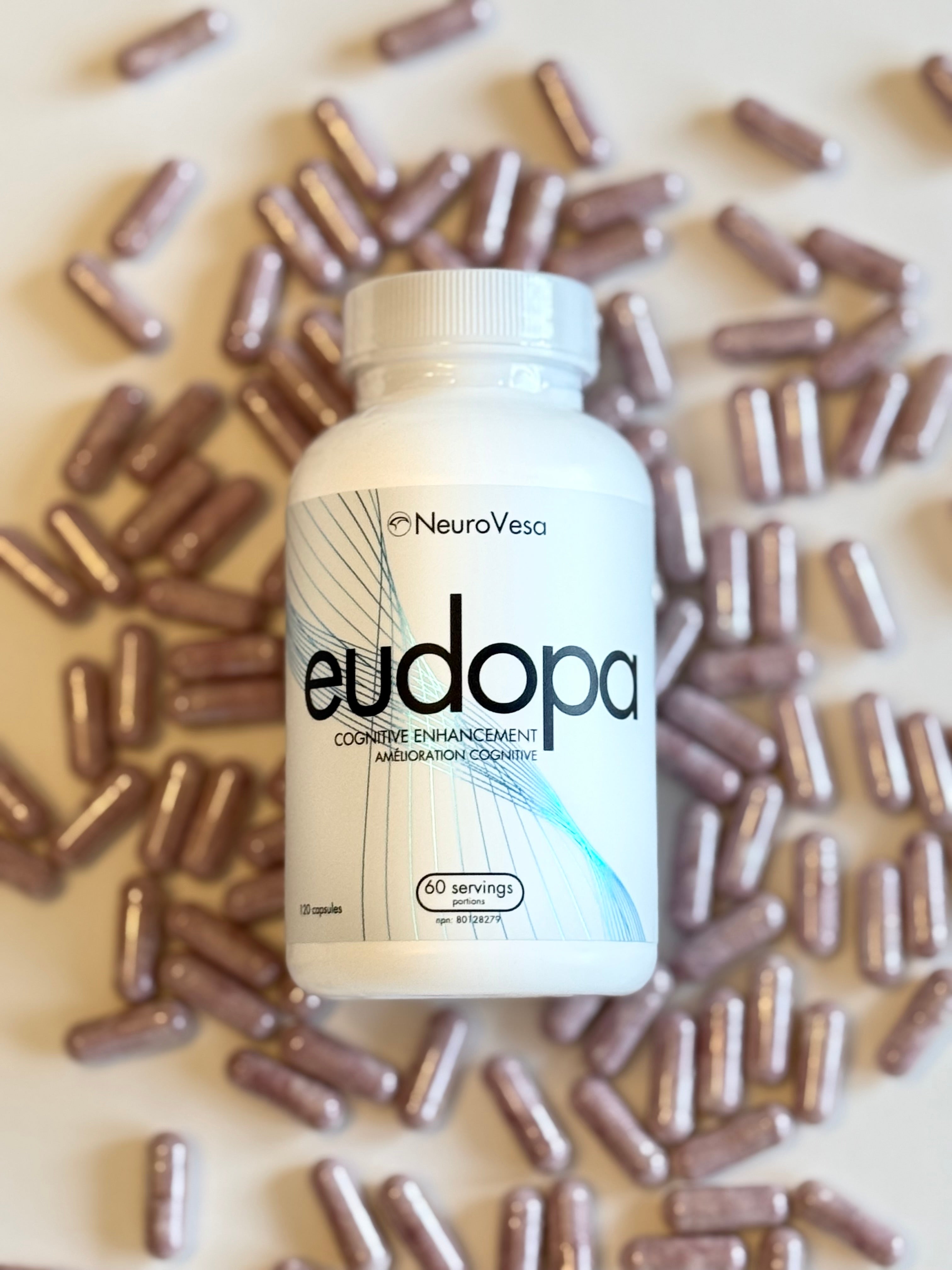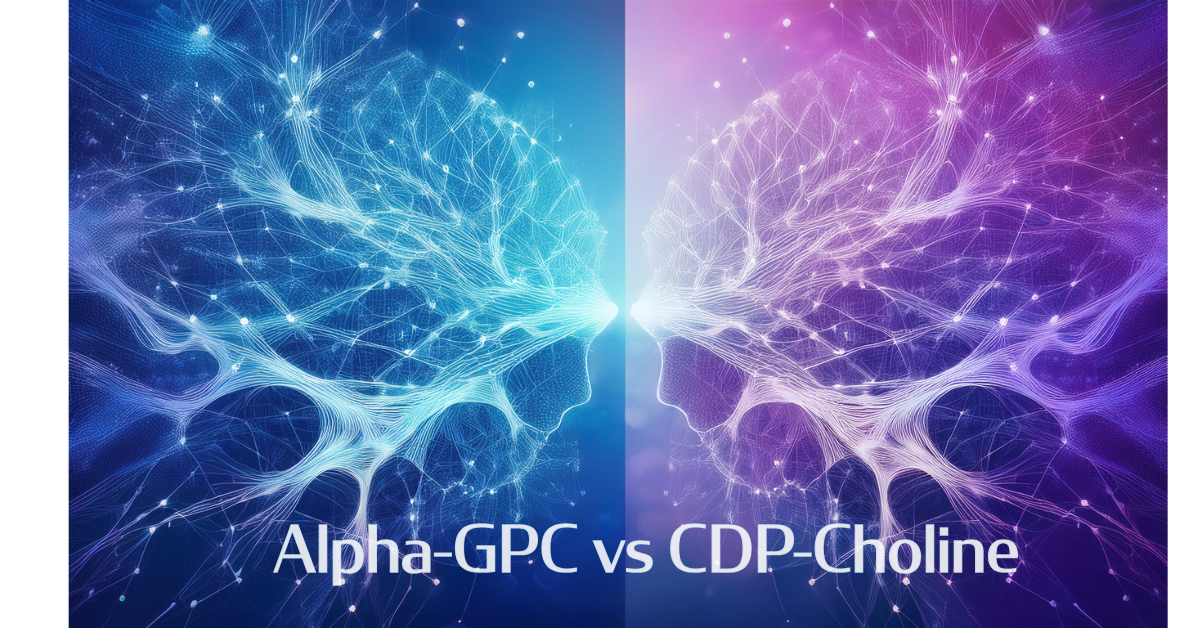🧠 Alpha-GPC vs CDP-Choline: Which Choline Source Is Best for Brain Health?
Choline is an essential nutrient that plays a critical role in brain health, memory, and cognitive function. It’s a building block for acetylcholine — a key neurotransmitter involved in learning, focus, and communication between neurons.
Among the many ways to supplement choline, two forms stand out: Alpha-GPC and CDP-Choline (also known as citicoline). Both are popular choices for supporting brain performance, but they work differently inside the body — and may offer distinct benefits depending on your goals.
In this article, we’ll take a science-based look at Alpha-GPC vs CDP-Choline, explore their mechanisms, benefits, dosages, and help you decide which one may be the better fit for you.
📚 Table of Contents
- What Is Choline and Why Is It Important?
- Choline From Diet vs Supplements
- What Is Alpha-GPC?
- What Is CDP-Choline?
- What's the Difference Between Alpha-GPC and CDP-Choline?
- Acetylcholine, Cognitive Performance, and Physical Performance
- Safety Comparison: Alpha-GPC vs CDP-Choline
- Why Is TMAO a Concern With Alpha-GPC but Not CDP-Choline?
- Key Differences Between Alpha-GPC and CDP-Choline
- Important Note on Dosages and Labeling
- Dosage Guidelines for Educational Purposes
- Why We Chose CDP-Choline for eudopa™
- Scientific References
What Is Choline and Why Is It Important?
Choline's Role in the Brain
Choline is a vital nutrient that supports several key functions, especially in the brain. It serves as a precursor for acetylcholine, a neurotransmitter critical for memory, attention, and learning. Without sufficient choline, the brain's ability to communicate efficiently between neurons is compromised.
Beyond Acetylcholine: Structural Support
Choline also plays a structural role by helping synthesize phospholipids like phosphatidylcholine, which maintain healthy, resilient brain cell membranes.
Summary:
Choline is essential for both brain communication and brain structure.
Choline From Diet vs Supplements: What You Need to Know
While choline is found naturally in foods like egg yolks, liver, beef, and soybeans, meeting optimal brain-specific needs through diet alone can be challenging.
Most dietary choline exists in forms like phosphatidylcholine, which primarily supports general cellular health but is less efficient at directly boosting acetylcholine levels in the brain.
The Advantage of Supplements
Targeted supplements like Alpha-GPC and CDP-Choline provide a more direct route. They are highly bioavailable, cross the blood-brain barrier efficiently, and deliver choline straight to where it matters most.
Summary:
Supplemental forms like Alpha-GPC and CDP-Choline are superior for boosting brain choline.
What Is Alpha-GPC?
Alpha-GPC (L-alpha-glycerylphosphorylcholine) is a naturally occurring choline compound that efficiently crosses the blood-brain barrier and rapidly increases acetylcholine levels. It supports memory, learning, and even muscle control.
Bonus Effect:
Alpha-GPC also delivers glycerophosphate, helping maintain the structure of brain cell membranes. It's often used for both cognitive enhancement and physical performance due to its potential to stimulate growth hormone release.
Summary:
Alpha-GPC is a fast-acting choline source that boosts both brain and muscle function.
What Is CDP-Choline?
CDP-Choline (cytidine-5'-diphosphocholine), also known as citicoline, is another highly bioavailable choline source. Upon ingestion, it breaks down into choline and cytidine.
Cytidine Conversion:
Cytidine is rapidly converted into uridine — a molecule critical for neuronal repair, synapse formation, and membrane synthesis.
Beyond Choline:
CDP-Choline not only supports acetylcholine production but also supports dopamine and norepinephrine signaling, enhancing focus, motivation, and cognitive resilience.
Summary:
CDP-Choline fuels both neurotransmission and brain repair.
What's the Difference Between Alpha-GPC and CDP-Choline?
Both Alpha-GPC and CDP-Choline increase acetylcholine, but they differ in their additional effects:
- Alpha-GPC: Fast cognitive and physical boost, supports cell membrane structure.
- CDP-Choline: Supports acetylcholine, neuronal repair, and dopamine/norepinephrine pathways.
🧩 Helpful Analogy:
Think of Alpha-GPC like a quick energy drink for your brain — fast and effective.
Think of CDP-Choline like a full repair-and-fuel kit — supporting both immediate function and long-term brain health.
🧠 Quick Example:
Use Alpha-GPC for a fast mental boost before a workout or exam.
Use CDP-Choline for daily memory support, cognitive resilience, and brain repair.
Acetylcholine, Cognitive Performance, and Physical Performance: What You Need to Know
Acetylcholine in Physical Performance
During strength training or sprinting, the body demands a massive release of acetylcholine to activate motor neurons and sustain muscular contraction. Alpha-GPC, with its rapid choline delivery, is ideal for these intense physical efforts.
Acetylcholine in Cognitive Performance
In tasks like studying or working, localized acetylcholine release occurs in the prefrontal cortex and hippocampus — but the overall quantity needed is smaller. Here, CDP-Choline supports not just acetylcholine, but also dopamine and norepinephrine systems.
Summary:
Alpha-GPC is better for quick physical boosts; CDP-Choline supports steady cognitive endurance.
Safety Comparison: Alpha-GPC vs CDP-Choline
While both are generally well-tolerated:
- Alpha-GPC may increase levels of TMAO (trimethylamine-N-oxide), a metabolite linked to cardiovascular risk. Some studies, including a 2022 study in the European Journal of Neurology, have suggested a slight increased risk of stroke with long-term high-dose Alpha-GPC use.
- CDP-Choline has an excellent safety record even at higher doses and does not significantly raise TMAO.
Why Is TMAO a Concern With Alpha-GPC but Not CDP-Choline?
Alpha-GPC releases free choline in the gut, where it can be converted by gut bacteria into TMA, then oxidized to TMAO in the liver.
CDP-Choline, being phosphorylated, reduces free choline exposure to gut bacteria and thus minimizes TMAO production.
Summary:
CDP-Choline is more stable and safer for daily use.
Key Differences Between Alpha-GPC and CDP-Choline

Important Note on Dosages and Labeling
Some Alpha-GPC products are sold as 50% extracts, meaning only half the listed amount is pure Alpha-GPC.
Always check whether the supplement label shows the actual Alpha-GPC content.
🧠 Dosage Guidelines for Educational Purposes
Disclaimer:
The following information is provided for educational purposes only and summarizes findings from published clinical studies. It is not intended to diagnose, treat, cure, or prevent any disease. Always consult with a qualified healthcare provider before starting any new supplement, especially if you have a medical condition such as stroke, concussion, or cognitive impairment.

Why We Chose CDP-Choline for eudopa™
When formulating eudopa™, our goal was to create a daily-use cognitive support supplement — one that supports multiple aspects of brain health.
- Supports acetylcholine and dopamine pathways
- Promotes neuronal repair and membrane synthesis
- Has an excellent long-term safety profile
- Is backed by decades of clinical research
While eudopa™ provides a subtle immediate boost in mental energy, its true strength lies in building lasting brain health — protecting and enhancing cognitive function over time.
📚 Scientific References
Alpha-GPC and Cognitive/Physical PerformanceBellar, D., LeBlanc, N.R., Campbell, B., et al. (2015). The effect of oral Alpha-GPC on isometric strength and psychomotor function. Journal of the International Society of Sports Nutrition, 12(19).
Ziegenfuss, T.N., Landis, J., Hofheins, J.E. (2008). Effects of an Alpha-GPC supplement on physical and psychomotor performance. Journal of the International Society of Sports Nutrition, 5(5).
Alvarez, X.A., Laredo, M., Corzo, D., et al. (1997). Citicoline improves memory performance in elderly subjects. Methods and Findings in Experimental and Clinical Pharmacology, 19(3), 201–210.
McGlade, E., Preston, T., Hlavin, J., et al. (2012). Citicoline supplementation improves attention and psychomotor speed in healthy adult women. Food and Nutrition Sciences, 3, 769–773.
Saver, J.L., Diener, H.C., Ferro, J.M., et al. (2015). Citicoline: Update on a promising and widely available agent for neuroprotection and neurorepair. International Journal of Stroke, 10(3), 292–293.
Rosas-Ballina, M., Reynolds, E., Ginty, D., et al. (2022). Effects of citicoline supplementation on appetite and hypothalamic signaling pathways. Nutrients, 14(15), 3079.
Hasselmo, M.E., & Sarter, M. (2011). Modes and models of forebrain cholinergic modulation of cognition. Neuropsychopharmacology, 36(1), 52–73.
Secades, J.J., & Frontera, G. (1995). CDP-Choline: Pharmacological and clinical review. Methods and Findings in Experimental and Clinical Pharmacology, 17(Suppl B), 1–54.
Barrachina, M., Secades, J.J., Ferrer, I. (1995). Citicoline increases the levels of NGF and NGF receptor expression after brain ischemia in rats. Brain Research, 697(1–2), 254–260.
Gatti, R., Barzaghi, N., Cavallini, L., et al. (1992). Protective effect of Alpha-GPC on dopaminergic neurons in aging rats. Brain Research Bulletin, 29(1), 173–175.
McGaughy, J., Kaiser, T., Sarter, M. (2002). Behavioral vigilance following infusions of 192 IgG-saporin into the basal forebrain: Selective removal of cortical cholinergic afferents impairs performance on a sustained attention task. Journal of Neuroscience, 22(6), 2212–2220.



